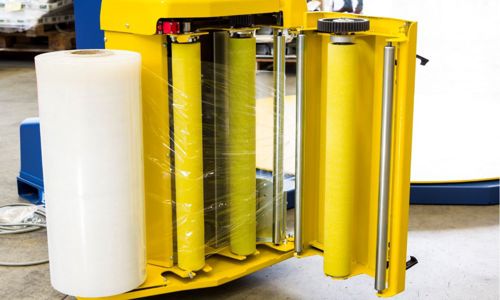Stretch Film Thickness Guide: What’s best for load security
Selecting the right stretch film is essential for ensuring secure packaging, protecting items during transport, and minimising costs. Opting for an unsuitable film can result in poor protection, higher expenses, and possible product damage. When choosing between hand or machine wraps, one of the key distinctions you'll notice is the thickness of the film, measured in microns. Understanding how to effectively select your stretch wrap is crucial to guarantee that your cargo is wrapped with the most cost-effective and sustainable solution.

Understanding Stretch Film Thickness
What is Film Thickness?
Film thickness is measured in microns (µm) and serves as a key indicator of stretch film durability and stretch capacity. Stretch film, which can sometimes be referred to as pallet wrap, shrink film or shrink wrap; is a popular packaging product for securing goods to pallets for transport or storage. It is predominantly made from virgin LLDPE (Linear Low-Density Polyethylene) resins. Stretch films can be produced in any thickness but it typically ranges from 10–30 µm, with some specialised films as thin as 5 µm. The choice of thickness depends on the nature of the cargo; heavier or sharp edged items necessitate thicker films, whereas lighter items are suited to thinner films. Legal implications exist if a load fails due to inadequate film thickness, making it crucial to select the correct film for specific applications.
Common Thickness Ranges
Industrial stretch films commonly range from 15–30 microns. Thicker films, around 30 microns, are ideal for securing heavy loads such as pallets of bricks, while thinner films, can be as thin as 9 microns to secure lighter cargo such as empty PET bottles. The right film thickness ensures optimal load security and cost effectiveness.
Why Thicker Isn’t Always Better
Using excessively thick stretch film can result in waste and unnecessary tension on the goods. Wrapping a pallet with film that is too thick, or overwrapping a pallet with too many layers of film does not necessarily mean it is safer during transport. The ideal application of film to the pallet will mean the film will perform like a ‘seatbelt’ in the event of transport stress. This means it will keep the load secure with enough elastic to move forward and bounce back in the event of heavy braking or tilting. However, if the film applied is too thick, there is no elastic in the event of transport stress - turning the pallet into a projectile. The goal is to match the film thickness to the specific load and transport requirements, ensuring efficient and secure containment without excess material.
Impact of Film Thickness on Load Safety
Load Shifting and Film Failure
Inadequate film thickness can lead to load shifting and potential film failure during transit. This is where the stretch film will break down under pressure resulting in significant safety concerns and costly damaged goods.
Overwrapping and Cost Waste
Applying too much pallet wrap, either through using thicker films or overwrapping, can lead to increased costs and material waste. Companies will also reduce their use of one-way plastic by effectively applying the right amount of film for their load.
Choosing the Right Stretch Film Thickness
Type of Load
Consider the load's shape and weight. Irregular shapes, sharp corners, and heavy pallets require different film thicknesses compared to regular or extremely lightweight loads.
Pallet Stability
Assess whether the pallet is solid or top heavy. Unstable pallets may need additional support from thicker films to prevent tipping or shifting.
Transit Environment
Factors such as long hauls, high humidity, and vibration risks affect the choice of film thickness. Ensure the film can withstand the environmental conditions encountered during transport.
Packaging Volume
Those businesses that are wrapping lower volumes of pallets may be wrapping them manually by hand. Hand wrapping pallets delivers less consistent results than using a pallet wrapper or stretch wrapping machine. A human will generally only stretch film 50-75% whilst machines can achieve up to 400%. This means that for those wrapping by hand it would be best to select FROMM’s hybrid hand film or verde film. For those wrapping a high volume of pallets with a machine that includes a pre-stretch carriage they may benefit from using FROMM’s machine grade FORZA film.
FROMM Solutions for Load-Safe Stretch Wrapping
FORZA Stretch Film
FROMM FORZA stretch films provide optimum performance at lower film gauges. Developed for use in high speed, power pre-stretch applications, in automatic and semi-automatic pallet wrapping machines
These thinner machine films significantly reduce plastic usage without compromising on effective load containment.
Verde Stretch Film
The Verde Stretch Film range is is a range of hand and machine films with 30% post consumer recycled content. Verde stretch wrap may have lower performance than virgin resin films, but they remain highly effective for many applications.
Hybrid Stretch Film
FROMM has developed a hybrid machine grade stretch film, specifically designed for low volume stretch wrapping machines.
A stretch wrapping machine performs at its best with the right film. Hybrid stretch film is ideal for wrapping machines with limited stretch capabilities. This ensures optimal use of stretch film without relying on thicker, single-use plastic. Hybrid is a lightweight film that boasts excellent puncture resistance and load containment properties, and is available in longer rolls for greater efficiency.
When paired with the right stretch wrapping machine, hybrid machine wrap can reduce your one-way plastic film by up to 40%.
More Guidance
If you are unsure which stretch film thickness is correct for your goods reach out to the FROMM team for advice. We can test how your wrapped pallets will perform under transport stress with our transport simulator, this testing can then give you exact recommendations for how to wrap your pallets including film selection and wrapping patterns.
Got questions? Let’s get it quickly wrapped up. Contact us online or talk to an expert 1800 940 356.









